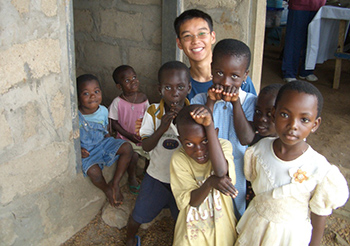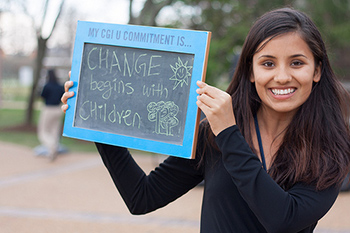
By:
- Christine Clark
Published Date
By:
- Christine Clark
Share This:
UC San Diego Students Attending Clinton Global Initiative University Find Inspiration to Use Talents to Help Others
Combating HIV, alleviating poverty, promoting peace and human rights and preserving the environment are just some of the goals driving the group of 21 UC San Diego students who recently attended the Clinton Global Initiative University, held at Washington University in St. Louis.

Community service is at the core of the mission of the annual conference, which was launched in 2005 by President Bill Clinton. The aim of the three-day event, also known as CGIU, is to turn young students into philanthropists—hopefully for the rest of their lives, according to Clinton.
UC San Diego hosted CGIU in 2011. Clinton said he chose UC San Diego because of its ongoing and consistent dedication to community service and mentioned UC San Diego being ranked No. 1 by Washington Monthly at various appearances he made on campus.
In order to attend CGIU, students have to submit an application and identify a service project or “commitment to action” they would take on during the year.
One of this year’s CGIU attendees, UC San Diego senior Philip James Loury, volunteered at the conference at UC San Diego in 2011. He said that experience inspired him to apply to attend CGIU in both 2012 and 2013.
“Experiencing firsthand the commitment and dedication to serve others exhibited by the CGIU attendees guided me towards starting a chapter of Engineering World Health at UC San Diego,” Loury, a bioengineering major, said.
Engineering World Health is a national nonprofit organization designed to mobilize the biomedical engineering community to improve the quality of health care in developing nations. The UC San Diego chapter, co-founded by Loury, aims to significantly reduce and eventually end the transmission of HIV in Mozambique, Africa. Working with the UC San Diego Center for AIDS Research, Engineering World Health designs more affordable lab equipment needed to perform HIV treatment analysis.
Similar to Engineering World Health, all of UC San Diego CGIU students' commitments to action are set in international locations. Most are group projects, but some are being taken on by individual students.

Nitya Timalsina
Nitya Timalsina, a third-year environmental chemistry major, attended the conference to support her commitment to action, Begin with Children. The project’s goal is to help solve global environmental and educational challenges within Nepalese communities.
“We’re dedicated to creating a culturally flexible environmental education programs for schools in Kathmandu, Nepal,” Timalsina said. “Our aim is to expose students, as well as parents, teachers and the larger community on environmental challenges and solutions.”
In addition to seeing Clinton and other notable speakers, including Jack Dorsey, co-founder and executive chairman of Twitter, and Hawa Abdi Diblawe, founder of the Dr. Hawa Abdi Foundation, Timalsina met other students also passionate about community service.
“I think that the highlight of the conference was meeting other attendees, sharing stories, and receiving valuable suggestions,” Timalsina said. “Perhaps unexpectedly, I met an amazing group of Nepalese commitment makers who have given me excellent insight about working in Nepal and with whom I plan to collaborate in future projects.”
Beke Chuluun attended the conference for his commitment to action, the Oasis Project, which is aimed at increasing public health by helping Mongolians to identify better water quality. Chuluun, a biochemistry major, also was inspired by the other college students attending CGIU.
“Every single students that I met had a great project and was already far along in terms of making a difference in their chosen community, field and commitment,” said Chuluun.
The Oasis Project is designed to map heavy metal pollutants such as lead, mercury and cyanide in drinking water sources in Mongolia.
“We are trying to map out water quality similar to how Google shows you traffic on its map,” said Chuluun. “Every time a person checks their water quality, the result is displayed on their phone via Bluetooth while the result is sent to our server using a cellular network so we can visualize it.”
“To be honest, I wanted to attend CGIU to shake hands with President Clinton and get funding for my project,” said Chuluun. “However, I got so much more. I was able to meet with water experts who can help us with the field tests for the Oasis Project.”
On the final day of CGIU, Comedy’s Central’s Stephen Colbert joined the meeting, where he filmed a segment for his show, “The Colbert Report.”
Loury, who attended the conference with three other members of UC San Diego’s Engineering World Health, said Colbert’s appearance was a highlight among many at the conference.
“CGIU was a great experience for my fellow officers and I to re-commit ourselves to our project,” he said.
The conference is not only inspiring, he added, but allows for its participants to gain practical knowledge that helps make their commitments to action more successful.
“We not only got to meet with other teams also working on affordable medical technology, but attended workshops on organizational leadership, and cultural integration of new technology into developing world communities,” Loury said.
Later this year, two members of Engineering World Health will travel to Mozambique to work with the local health care professionals at Eduardo Mondlane University. The students will evaluate the current HIV treatment analysis techniques currently being used in Mozambique in order to assess opportunities to deploy the lab equipment that Engineering World Health has designed.
Share This:
You May Also Like
Stay in the Know
Keep up with all the latest from UC San Diego. Subscribe to the newsletter today.


